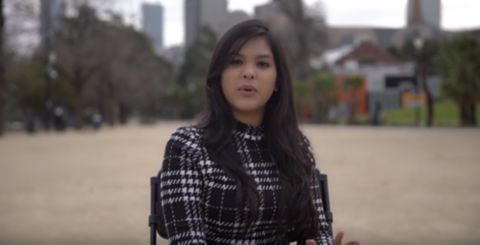- Entry score:
- Duration:
- Full-time 6 months
- Part-time 1 year
- Fees:
- Next intake:
- February, July
- Location:
- Melbourne City
Data science is an emerging area that drives economic growth, public policy and corporate strategy.
Data scientists manage large collections of data to extrapolate insights that benefit businesses and society.
As a data scientist, you'll work with many different programming languages, including R and Python, and will look for order and patterns in data. Using these trends, you'll influence a business' bottom-line using analytical techniques, such as machine learning, deep learning and text analysis.
Gain practical skills that allow you to handle data through the analysis lifecycle, from access and processing to modelling and visualisation. Learn about fundamental statistical concepts and build on this with sampling and hypothesis testing methods. Using open source software, you’ll have the skills to turn complex, real-world data into meaningful information.
Learn from professionals and academics who share their knowledge, research and experience.
Learn with the assurance of our Industry Advisory Committee, who guarantee course material remains relevant and evolves according to sector needs.
Acquire the professional skills and experience to build your career as a data scientist in a broad array of positions.

Learn how Data Science student Tanyya turned a lifelong interest in patterns into an internship at ANZ, and what she loves about Melbourne.

The Graduate Certificate in Data Science is also available via online delivery.
Please note: this graduate certificate is not available for international students intending to study on a student visa. If you are holding a temporary visa (other than a student visa) and your visa has a full study entitlement, you may be eligible to apply. For more information, see the international students with other temporary (non-student) visas.
As a student of data science, you'll explore engaging subjects, including data theory and the latest processing tools from an industry perspective.
Upon completion of this course, you'll have a new set of practical skills applicable to roles in a range of fields.
You'll learn about applied mathematical and statistical knowledge and methodologies, how to use critical analysis to solve a range of data science problems, analyse problems, use a range of communication skills to interpret data and insights and be able to reflect on your practice.
Your learning involves a varied mix of study modes, such as project work, seminars, online and flexible learning.
Assessment in this course includes assignments and projects, reflective journals, assessed tutorials and presentations and self or peer assessment.
The types of classes you have will depend on the course you’re studying. Classes are offered in various formats designed to provide meaningful engagement with staff, industry and peers and provide for access and use of spaces where learning can be applied and active, including an array of specialised equipment.
Most RMIT courses do not include passive large-scale classes such as lectures, instead the content traditionally provided in lectures is made available online. This may be in the form of readings, videos or other on-demand learning materials. This content will also support the basis of interactive learning that takes place in on-campus classes.
The Industry Advisory Committee (IAC) for this course is made up of employers and industry professionals.
They ensure that the course content remains relevant to your needs as a graduate and the needs of graduate employers. The committee provides feedback on the course, the changing needs of industry, and provides input into the design of new courses.
The knowledge and skills you will acquire throughout this degree and how they can be applied in your career are described in the learning outcomes.
The Graduate Certificate of Data Sciences comprises four core subjects.
In this certificate, you will explore Python and its uses with data science, applied analytics, and data wrangling, visualisation and communication.
Choose a plan below to find out more about the subjects you will study and the course structure.
Excellent opportunities exist for graduates. You may be qualified for roles such as:
RMIT has enduring links with the information and communications technology industry, both within Australia and internationally. Our Industry Advisory Committee is made up of employers and industry professionals, who have contributed to the development and ongoing improvement to the course content. Their participation means the course is relevant to your needs as a graduate so you can best fit into the job market. Industry contributes to our seminars, marketing events, industry awards and scholarships.
You need to satisfy all of the following entry requirements to be considered for entry into this degree.
You must have:
OR
If you wish to have industry or employment experience assessed as part of meeting the entry requirements you will need to provide a detailed CV/resume listing previous positions, dates of employment and position responsibilities; a statement from your employer confirming these details (or contact details of employer so RMIT can seek confirmation); and evidence of any relevant professional development undertaken.
International qualifications are assessed for comparability to Australian qualifications according to the Australian Qualifications Framework (AQF).
*If your qualification was completed more than 10 years ago you will need to provide evidence of ongoing professional work and/or professional development in the same discipline as the program for which you are seeking entry to be granted credit.
There are no prerequisite subjects required for entry into this qualification.
A selection task is not required for entry into this qualification.
You must meet the University's minimum English language requirements to be eligible for a place in this program.
You can gain entry to this graduate certificate from a range of RMIT undergraduate programs, if you meet the entry requirements.
Credit, recognition of prior learning, professional experience and accreditation from a professional body can reduce the duration of your study by acknowledging your earlier, relevant experience.
Graduates of the Graduate Certificate in Data Science can continue their studies in the Master of Data Science or the Master of Analytics and receive full credit for their completed studies.
Amounts quoted are indicative fees per annum, and are based on a standard year of full-time study (96 credit points). A proportionate fee applies for more or less than the full-time study load.
*Fees are adjusted on an annual basis and these fees should only be used as a guide.
This program is offered on a full-fee paying basis only. If you are offered a place, you will need to pay the full tuition costs of your program. However, eligible students (such as Australian citizens or holders of an Australian permanent humanitarian visa) may apply to defer payment of some or all of their tuition fees via the Commonwealth Government’s FEE-HELP loan scheme.
For information on how to pay your fees or how to apply for a refund, please see Paying your fees and applying for refunds.
In addition to tuition fees, you will be charged an annual student services and amenities fee (SSAF), which is used to maintain and enhance services and amenities that improve your experience as an RMIT student.
The SSAF is calculated based on your enrolment load and the maximum fee for 2025 is $365.
You may also be required to purchase other items related to your course, including field trips, textbooks and equipment. These additional fees and expenses vary from course to course.
Eligible students (such as Australian citizens or holders of an Australian permanent humanitarian visa) may apply to defer payment of some or all of their tuition fees via the Commonwealth Government’s FEE-HELP loan scheme.
You may be eligible to apply to defer payment of the Student services and amenities fee (SSAF) through the SA-HELP loan scheme. If you use SA-HELP, the amount will be added to your accumulated HELP debt.
If your FEE-HELP and/or SA-HELP loan application is successful, the Australian Government will pay RMIT, on your behalf, up to 100% of your fees. This amount will become part of your accumulated HELP debt.
You only start repaying your accumulated HELP debt to the Australian Government once you earn above the minimum income threshold for repayment, which is set each year by the Australian Government (this also applies if you are still studying). The Australian Taxation Office (ATO) will calculate your compulsory repayment for the year and include this on your income tax notice.
For more information about loan repayment options see Commonwealth assistance (HELP loans) or Study Assist.
This program is approved for income support.
You may be eligible for student income support payments from the Commonwealth Government if you are undertaking a graduate certificate, graduate diploma or an approved professionally oriented masters by coursework program. For more information see Income support for Masters students.
If you are enrolled in an eligible program you will also need to satisfy all other student payment eligibility requirements. You can contact Centrelink or Services Australia for further information about student income support entitlements, your eligibility and how to apply.
You may be eligible to apply for income tax deductions for education expenses linked to your employment.
See the Australian Taxation Office (ATO) for more information.
RMIT awards more than 2000 scholarships every year to recognise academic achievement and assist students from a variety of backgrounds.
Use our Frequently Asked Questions to learn about the application process and its equity access schemes, find out how to accept or defer your offer or request a leave of absence, discover information about your fees, refunds and scholarships, and explore the various student support and advocacy services, as well as how to find out more about your preferred program, and more.
Acknowledgement of Country
RMIT University acknowledges the people of the Woi wurrung and Boon wurrung language groups of the eastern Kulin Nation on whose unceded lands we conduct the business of the University. RMIT University respectfully acknowledges their Ancestors and Elders, past and present. RMIT also acknowledges the Traditional Custodians and their Ancestors of the lands and waters across Australia where we conduct our business - Artwork 'Sentient' by Hollie Johnson, Gunaikurnai and Monero Ngarigo.
Welcome to RMIT - Study@RMIT
Live chat hours
For after hours assistance, submit your enquiry and we'll get back to you as soon as possible.